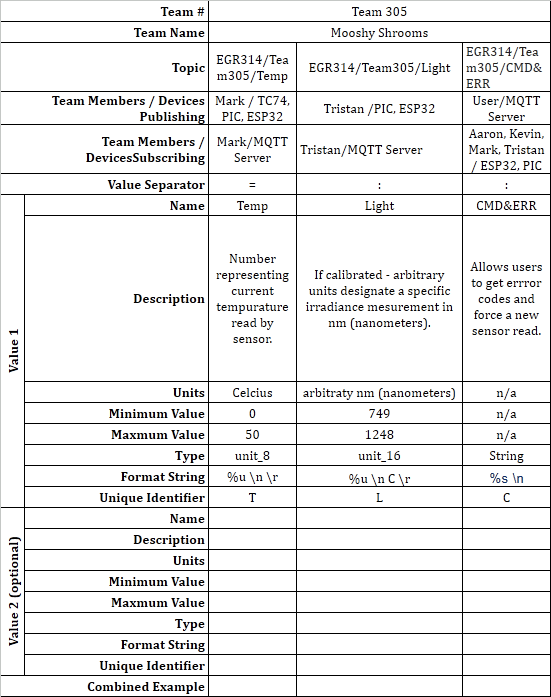Appendix E: MQTT Topic Table and C code
MQTT Topic Table

C project code
/* PROJECT: PRO_FullCode.X
* EGR314 6PM Team 305 Microcontroller Code for Weather Station Project
* Mark Alvarez, Tristan Dunton, Kevin Hays, Aaron Karsten
* Professor: Travis Kelley
* Main author: Kevin Hays
* Supporting authors: Tristan Dunton, Mark Alvarez, Aaron Karsten
* Last Rev. 04/23/2023
*/
/* TODO:
* Ask Kelley about Timestamps over MQTT-----------------------------------------Call to something? Server maybe?
* Ask Kelley how to push to different topics with ESP---------------------------Change variable in async mqtt.py
* Ask Kelley how to check if the data was sent----------------------------------Unknown
*/
#include "mcc_generated_files/mcc.h"
#include "mcc_generated_files/examples/i2c2_master_example.h"
#include "mcc_generated_files/i2c2_master.h"
#include "stdio.h"
#include <stdint.h>
#include <stdbool.h>
#include <xc.h>
#include <stdlib.h>
//Check if sensors and motor are readable
int CheckSystem(void){
//Initialize variables
uint8_t tempCheck, lightCheck, errorCode;
char motorData[100];
//Reads anything from the sensors to make sure they're connected
tempCheck = I2C2_Read1ByteRegister(0x4C, 0x00);
lightCheck = I2C2_Read1ByteRegister(0x39, 0x5A);
//Reads anything from the motor to make sure it's connected
CSN1_SetLow();
__delay_ms(10);
motorData[0] = 0b11001101;
SPI1_ExchangeBlock(motorData, 1);
__delay_ms(100);
CSN1_SetHigh();
//Returns errors if nothing was read!
if (tempCheck == 0){
printf("Error Code 8!");
errorCode = errorCode + 8;
}
if (lightCheck == 0){
printf("Error Code 9!");
errorCode = errorCode + 9;
}
if (motorData[0] != 0b11001101){
printf("Error Code 7!");
errorCode = errorCode + 7;
}
switch(errorCode){
case 7:
printf("Error Code 7!");
break;
case 8:
printf("Error Code 8!");
break;
case 9:
printf("Error Code 9!");
break;
case 15:
printf("Error Codes 7 & 8!");
break;
case 16:
printf("Error Codes 7 & 9!");
break;
case 17:
printf("Error Codes 8 & 9!");
break;
case 24:
printf("Error Codes 7, 8, & 9!");
break;
}
return errorCode;
}
void Enable_LS(void){
I2C2_Write1ByteRegister(0x39,0x80, 0b00011011); //enable device function
}
//Runs the motor forward (Steps 1 & 3)
void MotorForward(void){
char data[100];
CSN1_SetHigh();
SPI1_Open(SPI1_DEFAULT);
//Forward
CSN1_SetLow();
__delay_ms(10);
data[0]=0b11111111;
SPI1_ExchangeBlock(data, 1);
__delay_ms(1000);
CSN1_SetHigh();
//printf("Forward!\r");
//Stop
CSN1_SetLow();
__delay_ms(10);
data[0]=0b11101101;
SPI1_ExchangeBlock(data, 1);
__delay_ms(1000);
CSN1_SetHigh();
//printf("STOP!!\r");
}
//Runs the Motor Backwards (Step 2)
void MotorReverse(void){
char data[100];
//Reverse
for(int i; i < 20; i++){
CSN1_SetLow();
__delay_ms(10);
data[0]=0b1111110;
SPI1_ExchangeBlock(data, 1);
__delay_ms(100);
CSN1_SetHigh();
}
//printf("Reverse!!!\r");
//__delay_ms(1000);
//Stop
for(int i; i < 10; i++){
CSN1_SetLow();
__delay_ms(10);
data[0]=0b11101101;
SPI1_ExchangeBlock(data, 1);
__delay_ms(100);
CSN1_SetHigh();
}
//printf("STOP!!!!!!\r");
//__delay_ms(1000);
}
//PID Error checker
int ErrorCheck(uint8_t tAvg){
uint8_t tOrigin = I2C2_Read1ByteRegister(0x4C, 0x00);
uint8_t pidError = 0, t0 = 0, t1 = 0;
//Calculates the error. If it's greater than 2 degrees C, Run a test again.
if(abs(tOrigin - tAvg) > 2){
//Motor goes forward
MotorForward();
//Reads the sensors
t0 = I2C2_Read1ByteRegister(0x4C, 0x00);
//Motor goes backwards
MotorReverse();
//Reads the sensor
t1 = I2C2_Read1ByteRegister(0x4C, 0x00);
//Motor goes forwards to the origin
MotorForward();
//Averages the temperatures
tAvg = ((t0 + t1) / 2);
pidError = abs(tOrigin - tAvg);
printf("Recorded Temperature: %d; Temperature Error: %d; ", tAvg, pidError);
}
else{
printf("Recorded Temperature: %d; ", tAvg);
}
return pidError;
}
void EUSART2Transmit(void){
EUSART2_Receive_ISR();
volatile uint8_t unifData;
if(EUSART2_is_rx_ready()){
unifData = EUSART2_Read();
if(EUSART3_is_tx_ready()){
EUSART3_Write(unifData);
}
if(EUSART3_is_tx_done()){
}
//LED_0_Toggle();
}
}
void EUSART3Transmit(void){
EUSART3_Receive_ISR();
volatile uint8_t unixData;
if(EUSART3_is_rx_ready()){
unixData = EUSART3_Read();
if(EUSART2_is_tx_ready()){
EUSART2_Write(unixData);
}
if(EUSART2_is_tx_done()){
}
}
}
//Main Loop
void main(void)
{
// Initialize the device
SYSTEM_Initialize();
EUSART2_SetRxInterruptHandler(EUSART2Transmit);
EUSART3_SetRxInterruptHandler(EUSART3Transmit);
Enable_LS();
// Enable Interrupts
INTERRUPT_GlobalInterruptEnable();
INTERRUPT_PeripheralInterruptEnable();
//Initialize variables
uint8_t t0, t1, tAvg, lightData[2], lightBytes[2];
uint16_t L0, L1, LAvg;
int runTimer = 0;
int runTimeTotal = 0;
int errorCode = 0;
int pidError = 0;
int systemOK = 1;
float timeBuffer;
uint8_t ii = 0;
while (systemOK == 1){
t0 = I2C2_Read1ByteRegister(0x4C, 0x00);
lightBytes[0] = I2C2_Read1ByteRegister(0x39, 0x95); // data low bytes
lightBytes[1] = I2C2_Read1ByteRegister(0x39, 0x96); //data high bytes
lightData[0] = I2C2_Read1ByteRegister(0x39, 0xAD); // data low bytes, low light
lightData[1] = I2C2_Read1ByteRegister(0x39, 0xAE); // data high bytes, high light level
L0 = lightData[0] << 8 | lightData[1];
ii++;
printf("ii: %d; Temp: %d; Light %u; \r", ii, t0, L0);
__delay_ms(1000);
if(runTimer == 0){
errorCode = CheckSystem();
if(errorCode == 0){
//Motor goes forward
MotorForward();
//Reads the sensors
t0 = I2C2_Read1ByteRegister(0x4C, 0x00);
lightBytes[0] = I2C2_Read1ByteRegister(0x39, 0x95); // data low bytes
lightBytes[1] = I2C2_Read1ByteRegister(0x39, 0x96); //data high bytes
lightData[0] = I2C2_Read1ByteRegister(0x39, 0xAD); // data low bytes, low light
lightData[1] = I2C2_Read1ByteRegister(0x39, 0xAE); // data high bytes, high light level
L0 = lightData[0] << 8 | lightData[1];
//Motor goes backwards
MotorReverse();
//Reads the sensors
t1 = I2C2_Read1ByteRegister(0x4C, 0x00);
lightBytes[0] = I2C2_Read1ByteRegister(0x39, 0x95); // data low bytes
lightBytes[1] = I2C2_Read1ByteRegister(0x39, 0x96); //data high bytes
lightData[0] = I2C2_Read1ByteRegister(0x39, 0xAD); // data low bytes, low light
lightData[1] = I2C2_Read1ByteRegister(0x39, 0xAE); // data high bytes, high light level
L1 = lightData[0] << 8 | lightData[1];
//Motor goes forwards to the origin
MotorForward();
//Averages the temperatures and light
tAvg = ((t0 + t1) / 2);
LAvg = ((L0 + L1) / 2);
//Checks the error for the temperature. If it's too high, run the tests for temperature again to confirm
pidError = ErrorCheck(tAvg);
printf("Light Sensed: %d nm; \r", LAvg);
}
else{
systemOK = 0;
}
runTimer++;
runTimeTotal = runTimeTotal + runTimer;
timeBuffer = runTimeTotal / 10.0;
printf("Total Run Time: %f s.\r", timeBuffer);
}
else if(runTimer >= 18000){
runTimer = 0;
}
else{
runTimer++;
}
__delay_ms(100);
}
}
/**
End of File
*/
For the full project, as well as the python code for the ESP32, please refer to Team305’s code repo here.